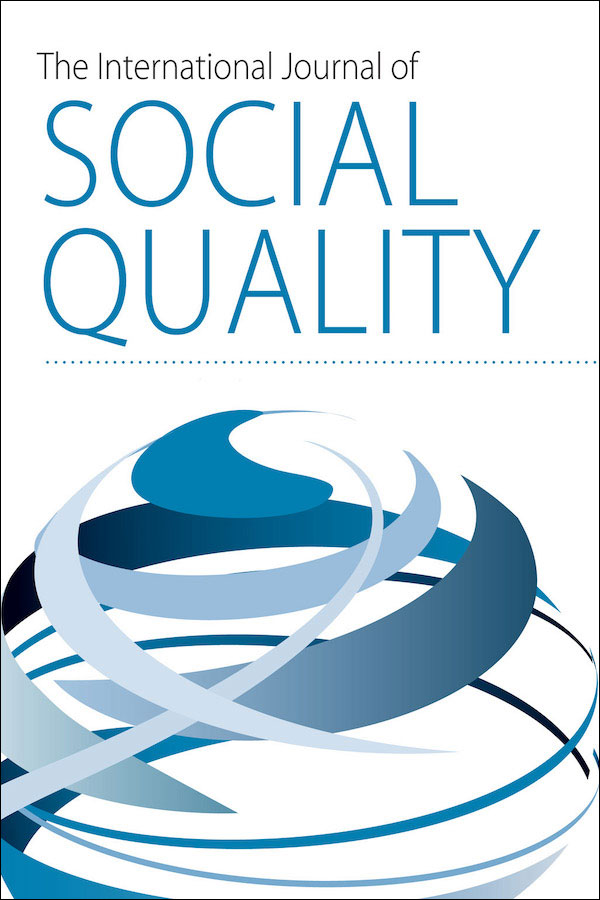
International Journal of Social Quality
(formerly The European Journal of Social Quality)
ISSN: 1757-0344 (print) • ISSN: 1757-0352 (online) • 2 issues per year
Editor: Laurent van der Maesen, International Association on Social Quality
Published in partnership with the International Association on Social Quality and the Chinese Academy of Social Sciences
![]() Available on JSTOR
Available on JSTOR
Latest Issue
Volume 14 Issue 1
Editorial
The UN World Summit 2025 for Social Development, a Manifesto about Urbanization Politics, and Four Studies Viewed from the Social Quality Perspective with the UN Summit in Mind
This Editorial—besides introducing four articles and a Manifesto on Urbanization—touches on a second topic, namely what can be learned from the articles and the Manifesto for understanding the preparative documents of the United Nations (UN) concerning the Second World Summit for Social Development in November 2025. It starts with considerations about what discussions from UN circles may entail. It continues by discussing the Manifesto and the articles, in which these considerations also play a role. It ends with a provisional conclusion.
Manifesto to the UN Pact for the Future
As academics, experts, and researchers worldwide, we wish to invite the global range of authorities and organizations to stimulate and support all initiatives that are focused on addressing the severe challenges of our time, especially concerning the field of urbanization. We regard it as vital to mitigate the impacts resulting from the deepening climate emergency and catastrophic loss of biodiversity, and to face the challenge of improving the overall living conditions for humankind on planet Earth.
Perspective of BRICS Future Urban Strategies, Viewed from a Social Quality Perspective
The deep changes resulting from globalization, the COVID-19 pandemic, and above all the accelerated use of new technologies in all fields are putting doubt the principles that guided urban development for centuries. Since the end of the twentieth century urbanization grown without any real opposition and the dogma that humanity will be mostly urbanized has been widely accepted. Projects for new megacities built from nothing have proliferated, especially in emerging countries of Asia and Africa, where the urban problems are greater. Under the banner of sustainability, proposals have been advanced for “smart cities” and “compact cities,” but most driven by economic and profit issues. This article asks what we can learn from the urban strategies of “BRICS” countries to cope with forthcoming challenges, and what theoretical substantiations can guide urbanization processes in an adequate way?
The Urbanization of the Southeast District of Amsterdam in the 1960s and 1970s
Lessons to Be Learned as Arguments for a Paradigm Shift in Urbanization Politics
This article describes and discusses the processes of urban development during the first phase of the urbanization of the Southeast District (SED) of Amsterdam. In order to provide insight into the nature of these processes two urban experiments are analyzed and interpreted. The first experiment was the District Communication Center (DCC) (1967–1973). The second was the Development Institute for Health Care (DIHC) (1976–1986). Deploying the “principles of the social quality perspective” the assumptions underlying both experiments are explored to unveil their implicit assumptions. Approaches to urbanization are interpreted by applying three ground-patterns of thought that underlie distinct discourses of contemporary urbanization. These explorations demonstrate the restrictions that come with the one-sided reduction of processes of urban development to “built urban infrastructure.” With the insights derived from both experiments, it is plausible that relational attention to the development of “societal urban infrastructure,” complementary to the “built urban infrastructure,” is indispensable for achieving acceptable human and societal content of built urban circumstances.
The Bulderbos: Campaigning Against Pollution from Schiphol Airport
Lessons from the Battle between an Organized Civic Initiative and a Political-Economic Complex
This article reconstructs the history of the “Bulderbos,” a forest that was established as the heart of a civic campaign coordinated by the NGO Milieudefensie to hinder the expansion of Schiphol Airport with a fifth runway. The campaign was one of the first large civic actions protesting the pollution, CO2 emissions, and climate footprint of a large Dutch industry. In response, Schiphol operated as part of a powerful political-economic complex. After ten years of campaigning, the court ruled that Schiphol could clear part of the Bulderbos. We discuss the context both of the rise of this strong civic initiative and of the ideology of the political-economic complex. The social quality perspective is deployed to explain what happened. We argue that civic initiatives are an indispensable part of the “checks and balances” that sustain democratic functioning. Regarding the contemporary rise of techno-autocratic political leadership, the Bulderbos represents a relevant and enlightening case.
The “Strength Compass” in Social Work
A Tool to Explore the Strengths and Resources of Clients
This study evaluated a new social work tool, the “Strength Compass,” as part of the person-centered intervention Pathways to Empowerment. It is deployed for the strength assessment of clients seeking support from municipal social support services. Evaluation of the prototype of the tool, through interviews with nine clients and a focus group of seven social work professionals, showed adequate to good comprehensibility, usability, and acceptability from the perspective of clients and professionals. Eight months after implementation, the tool's value for clients’ personal lives was explored through semi-structured interviews with sixteen clients receiving support from the teams. Almost all clients considered the tool beneficial to them. According to clients, the Strength Compass: (1) reinforces their self-consciousness and consciousness of available resources; (2) elicits joy and energy; (3) induces motivation and empowerment; and (4) has added value for the support trajectory provided. Practical and policy implications of these outcomes are discussed.